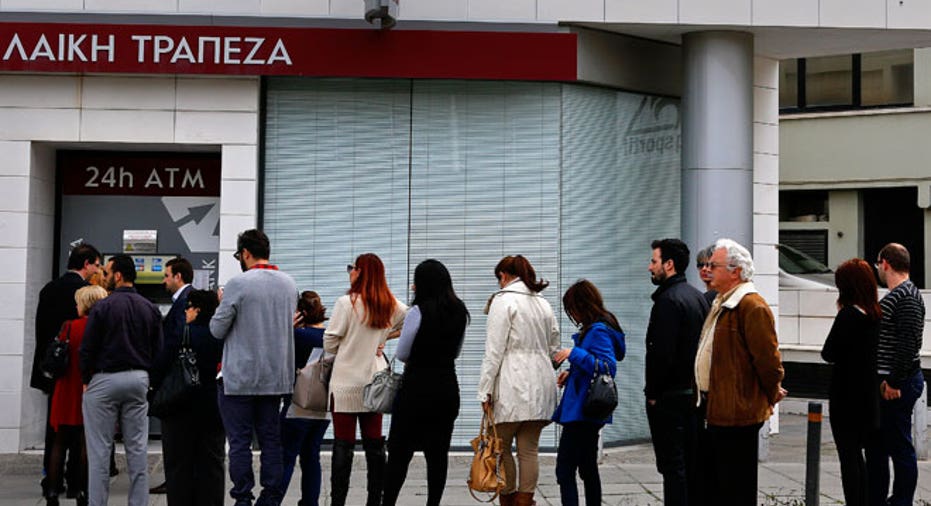What Happened in Greece After the Governmental Funding for the Arts Was Seized?

In a way, some Cypriots were victims of a bank robbery today. Just the heist was pulled off by their government instead of a masked deviant.
As part of a terminal-minute $13 billion bargain with international lenders to prevent the land from financial collapse, deposit-holders with more than 100,000 euros will face big losses. Upwards to 40% of the assets big depositors, including many Russians, believed they had safely stored in Cypriot banks were seized later on the Eu canonical the deal.
In the U.Southward., large investments of more than $250,000 in banks are insured by the Federal Eolith Insurance Corporation. Just amongst the unrest in Cyprus and our own uneven economic recovery, could the U.S. government always seize depositors' avails to avoid a banking collapse?
Very simply, no, says Marc Chandler, global head of currency strategy at Dark-brown Brothers Harriman. For starters, the banking structure in the eurozone is different from U.S. banks. "Fifty-fifty if you lot have your money in a New York bank [and alive in a different state], your deposits are insured by the federal regime. In Europe, insurance is on the land level."
Capital letter structure is also unlike in U.Due south. banks, Chandler says. U.S. banks are as well funded through stocks and bonds in addition to deposits, where Cypriot banks rely solely on depositors.
"There hasn't been a depositor haircut in the U.S. since the Great Depression," he says. "We are also a currency issuer, and Cyprus is a currency matrimony. We can really print coin here."
Even Federal Reserve Chairman Ben Bernanke spoke out on Cyprus' woes concluding week in a press conference saying the country is facing a "pretty big financial hole" and that it's "extremely unlikely" such a similar tax on deposits could have place in the U.Southward. He too noted that the FDIC has never "lost a dime of insured deposits."
Coin Market Wildcard
Those with their cash stored in coin market accounts may exist on edge because these accounts are not federally insured, but Paul Christopher, Wells Fargo primary international strategist, says they tin balance bodacious.
"There is no ground to worry just on what is happening in the eurozone and in Republic of cyprus. The banking differences are quite different. The avails that support money marketplace accounts [in the U.Due south.] are derived from sources safer than what you have in Cyprus."
The euro debt crunch in 2010 and 2011 forced U.S. money market accounts to accelerate divesting in Cypriot avails and moved more toward the U.K., Canada and Japan, according to Christopher.
Even during the financial crunch, Chandler says investors did not lose money from their coin market account investments because the Federal Reserve stood by the coin markets and wouldn't let them fail.
"They don't desire systematic risk," Chandler says of the Fed, "and letting money markets accounts neglect is systemic risk."
The just fashion investors in these accounts really lose is when returns on deposits are lower than the rate of aggrandizement. "The boilerplate American doesn't have and so much money that they are locked up in money markets," Chandler says. "The boilerplate American doesn't even take that much in savings."
Lesson Learned?
The situation in Cyprus is an example of what American investors should avoid, says Kim Forrest, vice president and senior analyst at money direction firm Fort Pitt Upper-case letter.
"These depositors were given ample time knowing that [Cypriot] banks were non solid but they still kept their funds in that location. Even though FDIC insurance exists, if I had a sketch bank or idea information technology wasn't as solid as I imagined, I wouldn't get out my deposits there."
Other options for depositors include ameliorate-capitalized banks—which aren't necessarily the largest or the ones advertising the loudest, she says.
"I don't ever want to take to observe out how to get my money dorsum."
Simply put, Forrest warns you shouldn't put more than than the amount the FDIC insures in one depository financial institution. Spread it out throughout several well-capitalized institutions if you lot tin can. Smaller businesses can face more than risk considering their accounts tend to height the $250,000 threshold of being insured by the FDIC, and during the 2008 plummet they were the ones most concerned about the security of U.S. banks.
"If this cash is what you will utilise for daily living, then don't mess with it," Forrest warns. "Don't attempt to go yields on information technology. That is another lesson; Republic of cyprus had ameliorate involvement rates, then people wanted those returns on their deposits. Anytime you get more return, you are accepting more than take chances."
harwardbacturter46.blogspot.com
Source: https://www.foxbusiness.com/features/asset-seizure-in-cyprus-could-it-ever-happen-in-the-u-s
0 Response to "What Happened in Greece After the Governmental Funding for the Arts Was Seized?"
Post a Comment